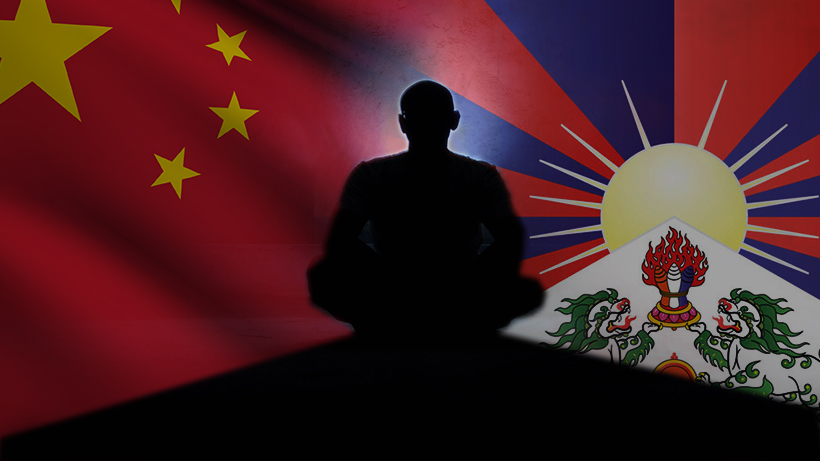
Source: This image was created for netivist.org. If you want to use it you simply need to attribute it by linking to this page or to https://netivist.org. Thanks
Find out more about the pros and cons of Tibetan independence. We discuss the history and future of Tibet. Should it become independent? What about the economic prosperity that China has brought to this beautiful country?
Tibetan independence from China: a good idea?
The current debate on the issue of Tibetan independence is largely divided between proponents and opponents of separatism. As the prominent philosopher Žižek has pointed out, our understanding of Tibet is often clouded by our orientalist imagination of the nation. As he says, “[o]ur fascination with Tibet makes it into a mythic place upon which we project our dreams”, often with disregard for real Tibetans who are not the new-age anti-consumerists spurned by the media. While acknowledging that the political reality of the authoritarian practices of the central government in China, this debate hopes to discuss the myths of the history of Tibet in order to shed light on its possible future.
What is the Dalai Lama’s position on the issue of independence?
The current 14th reincarnation of the Dalai Lama, Tenzin Gyatso, has longed abandoned his call for full independence of Tibet. He famously advocates for a “middle way” that combines some form of autonomy for Tibet over its cultural, spiritual and environmental matters while surrendering its defence, political and economic matters to Beijing. While his position has been challenged by many foreign exiles, it is a pragmatic recognition of the state of affairs today.
Chinese Occupation?
Most supporters of Tibetan independence often invoke unwanted Chinese occupation as a justification for a separate Tibetan state. However, could the Tibetan issue not be characterized as one that sprung from a latent majority-minority problem that exists in most developed countries? The example of the native Americans in the United States, Scottish nationals who have been brought into the English fold, and Crimea before its annexation by Russia, are more examples of structural minorities in Western polity. While not trivializing the claims to self-determination by the Tibetans, claims of Chinese occupation and demands for self-governance invariably involves much more than claiming the state is an alien political form to the people under it. Tibet can only be de facto considered independent between 1912-1950, after the collapse of the Qing dynasty before its incorporation in the People’s Republic of China. Prior to this, they have always existed as a vassal state of the Chinese empire. Historical claims of autonomy therefore do not seem legitimate. Ever since the 13th century Yuan dynasty conquest of Tibet, it has always been under the de jure or de facto influence of the Chinese empire.
What do Tibetans really want?
Robert Barnett, a scholar on Tibetan studies, warns that we should distinguish between “exile politics, which is a demand for anti-China this and anti-China that, with internal politics, which is much more pragmatic, complex, and sophisticated”. No publicly available surveys have been carried out to gauge the response of the Tibetan population. What is undeniable is that the current generation of Tibet has benefited far more from economic modernization than the exile community, including organizations such as Free Tibet and International Campaign for Tibet, who are often more militantly against Beijing. It is important to recognize that it is the exile community that have disproportionate access to the media and have a larger western audience than the Tibetan community.
The future of Tibet seems to be tied to that of China. But in your opinion, is Tibet a country? Do you think independence from China would be good news for the Tibetan people?
Watch these videos offering two contrasting views on the issue of Tibet independence from China:
Tibetan independence pros and cons
In support of Tibetan Independence:
- The government of the People's Republic of China first invaded Tibet in 1950, and forced the 14th Dalai Lama into exile despite the formal declaration of independence of Tibet prior to this.
- There have been accusations of human right abuses, cultural, religious, and political oppression in Tibet under Chinese rule. Information and press have also been restricted by Beijing.
- There has been widespread unrest in reaction to Chinese rule. Separatist activists have been arrested frequently. Since 2009, more than 140 Tibetans have self-immolated in protest against Chinese rule.
- The bilateral agreement in 1951 promised autonomy for Tibet, which has not been fulfilled due to the centralizing tendencies of the Chinese authorities.
- Independence may be the only way to guarantee Tibetan people's civil rights and freedom and establishing a fully-fledged democracy.
Against Tibet's independence:
- The history of Tibet-China relations is very old. For instance both China and Tibet were under Mongol rule. From 1720 to 1912 the Chinese Qing Dinasty controlled Tibet and actively promoted Tibetan buhddism.
- The 14th Dalai Lama has moderated his stance for independence for more autonomy. This is a more pragmatic approach to the solution of the conflict than outright independence. Changes in the way Beijing rules Tibet could be sufficient to satisfy most of the claims from the Tibetan population.
- We do not know what Tibetans really want due to the lack of available data and because a substantial population still remains difficult to reach. Maintaining the status quo may be a safer choice.
- Tibet still remains a largely impoverished state. Its economic situation has been improved through large state-directed investments by China. The modernization programme will be interrupted if independence is pushed through. Moreover, Tibet depends largely on Chinese imports. The future of Tibet outside of China is full of uncertainties and risks.
- There is no guarantee that an independent Tibet would develop a more just and democratic system. The country could be turned into a feudal theocracy where civil rights and freedom could be as limited as they are now or even more.
If you change your mind, you can change your vote simply by clicking on another option.
New to netivist?
Join with confidence, netivist is completely advertisement free. You will not receive any promotional materials from third parties.
Join the debate
In order to join the debate you must be logged in.
Already have an account on netivist? Just login. New to netivist? Create your account for free.
You are viewing a filtered list of comments. Click the button above to view all comments.
CONSULT A LICENSED RECOVERY COMPANY - TROPICAL DELIGHT RECOVERY
Hello I'm Peter Mcford from Chicago, i run a delivery company and was introduced to stock and cryptocurrency trade in 2019, i had high hopes for years untill recently when i decided to make withdrawals of my initial said profit for years, said to had worth $2.3B, i had made this decison cause recently one of my wharehouse was robbed and that got me into a serious problem i had no options or where to turn to cause the fed was on my nerves, i tried to withdraw severally but kept asking me to pay more and more money, i was left really devastated until i stumbled upon TROPICAL DELIGHT RECOVERY, this professionals helped me recover every scent i had invested with the broker i was trading with, at first i was skeptical about the whole process but then i just had to trust and they never disappointed me to my greatest surprise my investment worth $1.6M USD of bitcoin was recovered successfully and sent to my wallet address i just want to use this medium to thank TROPICAL DELIGHT RECOVERY and their expertise for their great work, the only best way i thought i could appreciate them for their efforts is to let the world know that bitcoin recovery with TROPICAL DELIGHT RECOVERY is 100% real reliable efficient and Good at what they do.
contact them today on
what'sapp +1. (347)....913......(6581)
Telegram @ tropicaldelightrecoveryhacker
Email tropicaldelightrecoveryhacker (@) out. look. co . m
htt. ps : /. (/) dev - t ropicaldelightrecovery .pantheonsite (.io)
Join the debate
In order to join the debate you must be logged in.
Already have an account on netivist? Just login. New to netivist? Create your account for free.



















